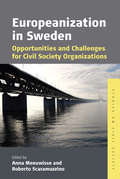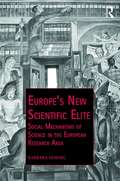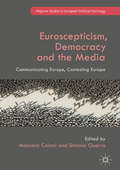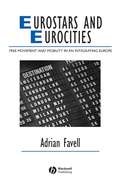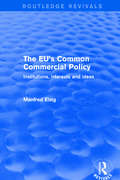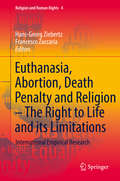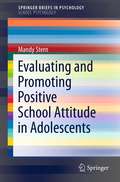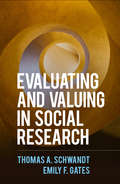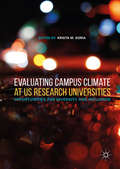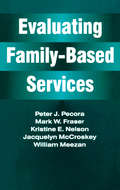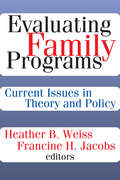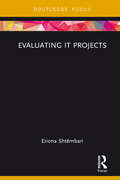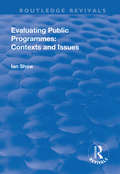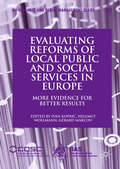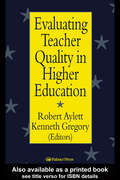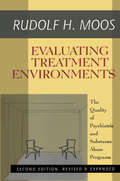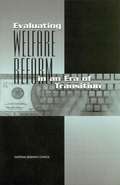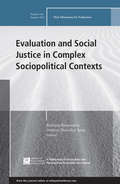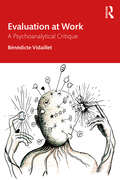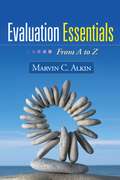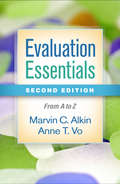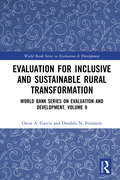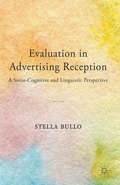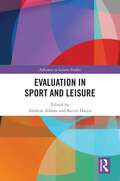- Table View
- List View
Europeanization in Sweden: Opportunities and Challenges for Civil Society Organizations (Studies on Civil Society #10)
by Anna Meeuwisse Roberto ScaramuzzinoNotwithstanding its many successes since 1945, the project of European integration currently faces major difficulties, from financial crises and mass immigration to the impending departure of the UK from the European Union. At the same time, these challenges have spurred civil society organizations within and across Europe, revealing a shared public sphere in which citizens can mobilize around refugee rights, opposition to austerity policies, and other issues. Europeanization in Sweden assembles new empirical research on how these processes have played out in one of the continent’s wealthiest nations, providing insights into whether, and how, the “Swedish model” can guide European integration.
Europe's Contending Identities
by Andrew C. Gould Anthony M. MessinaHow 'European' are Europeans? Is it possible to balance national citizenship with belonging to the European Union overall? Do feelings of citizenship and belonging respond to affiliations to regions, religions or reactionary politics? Unlike previous volumes about identity in Europe, this book offers a more comprehensive view of the range of identities and new arguments about the political processes that shape identity formation. The founders of European integration promised 'an ever closer union'. Nationalists respond that a people should control their own destiny. This book investigates who is winning the debate. The chapters show that attitudes toward broader political communities are changing, that new ideas are gaining ground, and that long-standing trends are possibly reversing course.
Europe’s New Scientific Elite: Social Mechanisms of Science in the European Research Area (Public Intellectuals and the Sociology of Knowledge)
by Barbara HoenigWinner of the Harald Kaufmann Prize for Senior Researchers, 2018 This book examines the question of whether the process of European integration in research funding has led to new forms of oligarchization and elite formation in the European Research Area. Based on a study of the European Research Council (ERC), the author investigates profound structural change in the social organization of science, as the ERC intervenes in public science systems that, until now, have largely been organized at the national level. Against the background of an emerging new science policy, Europe’s New Scientific Elite explores the social mechanisms that generate, reproduce and modify existing dynamics of stratification and oligarchization in science, shedding light on the strong normative impact of the ERC’s funding on problem-choice in science, the cultural legitimacy and future vision of science, and the building of new research councils of national, European and global scope. A comparative, theory-driven investigation of European research funding, this book will appeal to social scientists with interests in the sociology of knowledge.
Euroscepticism, Democracy and the Media
by Manuela Caiani Simona GuerraThis volume focuses on the relationship between the media and European democracy, as important factors of EU legitimacy. The contributors show how the media play a crucial role in making European governance accountable, and how it can act as an intermediate link between citizens and their elected and unelected representatives. The book focuses on widespread levels of Euroscepticism and the contemporary European crisis. The authors present empirical studies which problematize the role of traditional media coverage on EU attitudes. Comparisons are also drawn between traditional and new media in their influence on Euroscepticism. Furthermore, the authors analyse the impact of the internet and social media as new arenas in which Eurosceptic claims and positions can be made visible, as well as being a medium used by political parties and populist movements which contest Europe and its politics and policies. Euroscepticism, Democracy and the Media will be of interest to students and scholars with an interest in European politics, political parties, interest groups, social movements and political sociology.
Eurostars and Eurocities: Free Movement and Mobility in an Integrating Europe (IJURR Studies in Urban and Social Change Book Series #56)
by Adrian FavellEurostars and Eurocities: Free Movement and Mobility in an Integrating Europe examines intra-European Union migration in the cities of Amsterdam, London and Brussels. Based on sixty in-depth interviews of free moving European citizens, and more than five years of ethnographic and documentary research, it uncovers the rarely studied human dimension of European integration Examines the mobility, lifestyle and career opportunities created by the borderless society of the European Union, as well as the barriers that still persist Analyses the new migration trends, challenges to the welfare state, and forms of urban cosmopolitanism linked to processes of European integration
The EU's Common Commercial Policy: Institutions, Interests and Ideas
by Manfred ElsigThis title was first published in 2002. This volume aims to provide fresh insight into the complex struggles of the European Union (EU) institutions and the member states over who should negotiate trade issues on Europe's behalf. The book makes effective use of new empirical data on the daily operations of European trade policy based on interviews with high-ranking trade officials. Furthermore, this text is the first institutionalist analysis of the Amsterdam and Nice Intergovernmental Conferences (IGCs) in regards to the Common Commercial Policy (CCP). In sum, it provides the reader with an introduction into the field of international trade regulation from an EU perspective. Presented within the context of the long-standing institutional debate and using case studies on the operation of the CCP in the 1990s, this book facilitates a deeper understanding of the challenges facing Europe in the 21st century.
Euthanasia, Abortion, Death Penalty and Religion - The Right to Life and its Limitations: International Empirical Research (Religion and Human Rights #4)
by Hans-Georg Ziebertz Francesco ZaccariaThis book considers how the termination of life might be accepted in the view of a general obligation to protect life. It features more than 10 papers written by scholars from 14 countries that offer international comparative empirical research. Inside, readers will find case studies from such areas as: India, Chile, Germany, Italy, England, Palestine, Lithuania, Nigeria, and Poland. The papers focus on three limitations of the right to life: the death penalty, abortion, and euthanasia. The contributors explore how young people understand and evaluate the right to life and its limitations. The book presents unique empirical research among today's youth and reveals that, among other concepts, religiosity matters. It provides insight into the acceptance, perception, and legitimation of human rights by people from different religious and cultural backgrounds. This investigation rigorously tests for inter-individual differences regarding political and judicial rights on religious grounds, while controlling for other characteristics. It will help readers better understand the many facets of this fundamental, yet controversial, philosophical question. The volume will be of interest to students, researchers, as well as general readers searching for answers.
Evaluating and Promoting Positive School Attitude in Adolescents
by Mandy SternAt a time when rates of depression and other mental health problems are increasing significantly among high school students, measures of school attitude and well-being are of central importance to school practitioners. Students with positive attitudes about school experience more beneficial outcomes and are also less likely to engage in maladaptive, risky behaviors. Therefore, monitoring how students feel about their experiences at school is important, and a novel, fresh approach to examining school attitude is sorely needed. Past studies of school attitude have generally focused on internal, psychological correlates of school attitude, such as individual and subjective reports of students' attitude toward school and their motivation levels. Evaluating and Promoting Positive School Attitude in Adolescents goes beyond these traditional measurements and explores less psychologically focused indicators, including ecological factors and observable behaviors. This study provides school psychologists with a new, comprehensive, and ecologically based approach with which to evaluate the school attitude of high school students.
Evaluating and Valuing in Social Research
by Thomas A. Schwandt Emily F. GatesMuch applied research takes place as if complex social problems--and evaluations of interventions to address them--can be dealt with in a purely technical way. In contrast, this groundbreaking book offers an alternative approach that incorporates sustained, systematic reflection about researchers' values, what values research promotes, how decisions about what to value are made and by whom, and how judging the value of social interventions takes place. The authors offer practical and conceptual guidance to help researchers engage meaningfully with value conflicts and refine their capacity to engage in deliberative argumentation. Pedagogical features include a detailed evaluation case, "Bridge to Practice" exercises and annotated resources in most chapters, and an end-of-book glossary.
Evaluating Campus Climate at US Research Universities: Opportunities for Diversity and Inclusion
by Krista M. SoriaThis book examines campus climate data collected from undergraduates at several large, public research universities across the nation to enhance understanding of the long-term impact of campus climate on student success. Many universities have refocused their attention and energy on campus climate, defined in this volume as students’ perceptions of how welcoming and respectful their campus environments are for students from different social identities. As structural diversity continues to grow more complex on college campuses around the nation, campus leaders have begun to take more steps to understand campus climate and address persistent inequalities, acts of discrimination, and violence against students from diverse backgrounds. The authors in this volume address initiatives to improve campus climate and provide empirical evidence on the effectiveness of those programs.
Evaluating Family-Based Services
by Peter J. Pecora Mark W. Fraser Kristine E. Nelson Jacquelyn McCroskey William MeezanFirst Published in 2018. Routledge is an imprint of Taylor & Francis, an Informa company.
Evaluating Family Programs: Current Issues in Theory and Policy
by Heather B. Weiss Francine H. JacobsThe diverse composition of American families and changing ways of raising our children have become subjects of intense scrutiny by researchers and policymakers in recent years. Shifting demographics and work patterns, growing numbers of women in the work force, teenage pregnancy, single-parent families, and the deinstitutionalization of the elderly, disabled, and mentally ill--all these trends have significantly affected family life. Evaluating Family Programs effectively bridges the gap between researchers and practitioners in order to bring practical, understandable advice to providers of family programs and to program funders and policymakers.Heather B. Weiss and Francine H. Jacobs have collected in this volume works which move outside the traditional approaches of their disciplines to create new models for delivering and evaluating services. This sets a mood of genuine inquiry and excitement about successful aspects of programs while maintaining openness about the limitations of both research and practice. By expanding the research model, this work is an attempt to understand reciprocal influences of extended family, culture, community, and social institutions. It urges those who advocate program accountability to understand that not all types of evaluations are appropriate for all programs, and it notes that limitations in current evaluation technologies make it difficult to evaluate outcomes.Evaluating Family Programs reminds the reader that in order to develop sound family policy we must look at children and families in context. Beacuse policymakers, program administrators, and informed citizens have come to rely more upon the results of evaluation research, we must improve our methods while not losing sight of its limitations. It is a thought-provoking contribution to the efforts of those who seek to support the American family with compassion, understanding, and realism.
Evaluating IT Projects (Routledge Focus on Business and Management)
by Eriona ShtëmbariProject management disciplines have been a part of IT for many years. Why then, are so many challenges still directly associated with how a project is managed? Many projects fail for a myriad of reasons; most, however, stem from poor or inadequate project evaluation and performance appraisal, while, improved project planning and direction is considered to be one of the key factors to IT project success. Eriona Shtembari arranges evaluation methods and techniques into three groups, managerial-financial-and-development. This book explores the process of project evaluation and the purposes of evaluation, given its strong relationship to the success of the project. It examines IT project evaluation; identifies methods and techniques to be used throughout the project life cycle; examines the benefits of project evaluation and proposes a systematic approach/framework of project evaluation to serve as a tool for successful project management. <P><P>Shtembari analyses the most up-to-date research relating to the process and methods/techniques of project evaluation, throughout the project life cycle. From the systematic literature review, she identifies the most usable methods and techniques in project evaluation and focuses on the adequacy of these methods and techniques in the service sector. The theoretical underpinning of the book, serves as a base to interpret the interviews in the case study and build a theory as to how the project evaluation context relates to the proposed scientific theory. The findings in this book provide solutions for practitioners to help them boost the evaluation framework and consequently improve their IT project management.
Evaluating Public Programmes: Contexts And Issues (Routledge Revivals)
by Ian ShawThis title was first published in 2000: A detailed study of a number of key issues arising in evaluation research, in particular the impact of context upon evaluation findings and the implication context has for methodology. Providing case study illustrations, the work includes discussion of definitions and uses, experimental logic, methods and difficulties in experimental evaluations and the importance of incorporating both process and context in evaluation research design.
Evaluating Reforms of Local Public and Social Services in Europe
by Ivan Koprić Hellmut Wollmann Gérard MarcouThis book explains the increasing demand for evaluation as a result of the increasing frequency of reforms to local services, influenced by the New Public Management doctrine, the severe austerity policy in many European countries, and the wish to increase quality and reduce costs of public services, especially at the local (sub-national) level. Positioned at the interface of local services and evaluation research, it will enable the utilization of evaluation-generated knowledge in evidence-based policy making by focusing on the lessons learned from evaluation of local service delivery. It encompasses local public and social services (including waste, water, public transport, healthcare, education and eldercare) and examines the hypothesis that there is a North-West-South-East divide in Europe in terms of the evaluation of local service reforms. Particular attention is devoted to the explanatory function of evaluation. Providing fresh insight into the functioning of local government machinery in contemporary Europe, this book will appeal in particular to practitioners and students of local government, public economy, public administration and policy.
Evaluating Teacher Quality in Higher Education
by Robert Aylett Kenneth GregoryDrawing on material presented at a one day conference, this collection addresses the need to recognize academics' contributions to higher education, as well as the ways in which academics' efforts in the teaching and learning process can be acknowledged and suitably rewarded.
Evaluating Treatment Environments: The Quality of Psychiatric and Substance Abuse Programs
by Rudolf H. MoosEvaluating Treatment Environments describes how to assess the quality of psychiatric and substance abuse programs and how to use that information to monitor and improve these programs. Its aim is to identify environments that promote opportunities for personal growth, simultaneously enhancing both physical and psychological well-being. Although treatment programs are diverse, Moos asserts that a common conceptual framework can be used to evaluate them, and more emphasis should be placed on the process of matching personal and program factors and on the connections between such matches and patients' outcomes.The book is divided into three main parts. Part I focuses on hospital programs, using a sample of 160 programs throughout the United States. Part II evaluates community programs. Moos describes how to monitor and improve these programs, and assesses program implementation. Part III considers treatment environments, examining factors that shape the treatment environment, patients' satisfaction with and participation in program activities, patients' adaptation and community living skills, and patient-program congruence and the influence of treatment environments on patients with different levels of impairment. It also highlights the importance of the health care workplace and its impact on staff and the treatment environment.Treatment programs vary substantially in their policies and services, especially in what they expect of clients, rules about clients' daily life choices, and to what extent clients must be governed by the program, and whether or not the programs provide health and treatment services. Comparison studies are becoming more important as clients move more quickly from acute in-patient to community residential care. Moos stresses the need to pay special attention to how programs and services affect clients when conducting evaluations. Evaluating Treatment Environments will be a necessary addition to the libraries of mental health service professionals, as well as sociologists, psychiatrists, psychologists, and social workers.
Evaluating Welfare Reform in an Era of Transition
by Institute of MedicineReform of welfare is one of the nation's most contentious issues, with debate often driven more by politics than by facts and careful analysis. Evaluating Welfare Reform in an Era of Transition identifies the key policy questions for measuring whether our changing social welfare programs are working, reviews the available studies and research, and recommends the most effective ways to answer those questions.This book discusses the development of welfare policy, including the landmark 1996 federal law that devolved most of the responsibility for welfare policies and their implementation to the states. A thorough analysis of the available research leads to the identification of gaps in what is currently known about the effects of welfare reform.Evaluating Welfare Reform in an Era of Transition specifies what-and why-we need to know about the response of individual states to the federal overhaul of welfare and the effects of the many changes in the nation's welfare laws, policies, and practices.With a clear approach to a variety of issues, Evaluating Welfare Reform in an Era of Transition will be important to policy makers, welfare administrators, researchers, journalists, and advocates on all sides of the issue.
Evaluation and Social Justice in Complex Sociopolitical Contexts: New Directions for Evaluation, Number 146 (J-B PE Single Issue (Program) Evaluation)
by Barbara Rosenstein Helena Desivilya SynaThis volume is devoted to the theme of social responsibility, social justice, and evaluation. It examines the evaluation–social justice interface and: shares a variety of options and examples from different settings, gives voice to populations whose voices are rarely heard, and contributes to fulfilling the potential of the significant role evaluation can have in promoting social change. First discussing issues related to evaluation, social responsibility, social justice, and marginalized populations in general, it goes on to address issues concerning populations marginalized due to health, psychological, and physical difficulties; their cultural or ethnic/national status; or the specific geopolitical context of Israel. This is the 146th issue in the New Directions for Evaluation series from Jossey-Bass. It is an official publication of the American Evaluation Association.
Evaluation at Work: A Psychoanalytical Critique
by Bénédicte VidailletEvaluation at work has attracted much criticism and its damaging effects are well known, so why does it continue to gain ground in every field? Evaluation at Work: A Psychoanalytical Critique offers an original answer to this question: evaluation spreads because we want to be evaluated. Developing a critical reflection from a psychoanalytic perspective, it argues that workers are not mere victims of evaluation systems but are complicit in them. In this fascinating volume, Bénédicte Vidaillet focuses on the aspects of our subjectivity that come into play in evaluation at work —our expectations, desires, need for recognition, our conceptions of ourselves at work, as well as our relationship with others such as colleagues, managers or clients — to explore how evaluation affects us, where it gets its evocative power, and what it stirs within us to make us want it, despite its detrimental effects in its currently practiced form. Chapters draw on real-life examples, case studies from a variety of organizations, and observations from clinical practice, to provide insight into the many mechanisms that have enabled evaluation to spread unimpeded through our subjective complicity in the process, revealing how they came to seem so innocuous. This book will be of interest to scholars studying the topic of evaluation at work from a critical perspective as well as professionals who use evaluation systems or are under the pressure of evaluation in all sectors and organizations. By exposing the psychological mechanisms that evaluation uses to appeal to us, it gives each of us the tools we need to break free of its grasp.
Evaluation Essentials
by Marvin AlkinWritten in a refreshing conversational style, this text thoroughly prepares students, program administrators, and new evaluators to conduct evaluations or to use them in their work. The book's question-driven focus and clear discussions about the importance of fostering evaluation use by building collaborative relationships with stakeholders set it apart from other available texts. In 26 concise sections, Marvin C. Alkin explores how to articulate answerable evaluation questions, collect and analyze data using both quantitative and qualitative methods, and deal with contingencies that might alter the traditional sequence of an evaluation. Student-friendly features include handy bulleted recaps of each section, "Thinking Ahead" and "Next Steps" pointers, cautionary notes, annotated suggestions for further reading, and an in-depth case study that provides the basis for end-of-chapter exercises.
Evaluation Essentials, Second Edition: From A to Z
by Marvin C. Alkin Anne T. VoThoroughly revised and updated, this engaging text has given thousands of students and new evaluators the practical information and expert advice needed to conduct or use evaluations. In 26 concise sections, the book describes how to articulate answerable evaluation questions, collect and analyze data using both quantitative and qualitative methods, and deal with contingencies that might alter the traditional sequence of an evaluation. Special strengths of the text are its attention to individual, organizational, and community culture and emphasis on building collaborative relationships with stakeholders. An in-depth case study and related end-of-section exercises (including group activities) help students put themselves in the evaluator role. Other pedagogical features include section titles written as questions, bulleted recaps of each section, "Thinking Ahead" and "Next Steps" pointers, cautionary notes, and suggestions for further reading. New to This Edition *New and expanded topics: evaluation contracts, budgeting, surveys, data visualization, qualitative coding and memoing, factors affecting evaluation use, and context-sensitive evaluation. *Revised case study with extended exercises that guide the reader to complete a simulated evaluation. *End-of-section "Quick Read" links to recommended American Evaluation Association blog posts. *Four entirely new sections (such as "How Do You Strengthen Relationships with Stakeholders?" and "How Do We Plan a Process-Focused Evaluation Design?"), plus other changes and additions throughout.
Evaluation for Inclusive and Sustainable Rural Transformation: World Bank Series on Evaluation and Development, Volume 9 (World Bank Series on Evaluation & Development)
by Oscar A. García Osvaldo N. FeinsteinWritten by a team of expert practitioners at the Independent Office of Evaluation of IFAD, this book gives an overview of evaluation practice at IFAD. It looks at how evaluation practice has evolved to reflect, respond to and inform changing expectations of development assistance. It reveals how evaluation products and methodologies have benefited from key reviews, revisions and lessons learned, and also how they have progressively strengthened IFAD’s capacity to assess its operations and better understand its results. The book concludes with reflections on some of the challenges that lie ahead, including how the independent evaluation function can continue to evolve to meet future challenges and enhance the impact of development initiatives on people’s lives. This valuable insight into practice will be of interest to researchers, practitioners and policymakers in development economics, development studies and rural studies.
Evaluation in Advertising Reception
by Stella BulloPlaced within the context of reception studies, this book investigates how advertisements that rely on re-contextualising shared cultural knowledge are understood by their viewers, and examines their persuasive potential.
Evaluation in Sport and Leisure (Advances in Leisure Studies)
by Andrew AdamsThis book presents a critical assessment of evaluation theory and practice in sport and leisure. It considers established and emerging forms of evaluation; examines typologies, issues, contexts and processes, and asks how evaluation practice can be improved in the future. The book seeks to uncover some of the tensions and dilemmas that are present in choosing and applying evaluation strategies. It considers the relationship between evaluation, context and evaluator to discern how and why a particular strategy is employed. It also highlights how power relationships affect and effect the evaluation process itself as well as those involved in conducting evaluations. The book encourages the reader to challenge accepted methodologies in evaluation, whilst acknowledging the central importance of evaluation and evidence for our understanding of the social impact and value of sport and leisure. This book is important reading for any student, researcher, practitioner or policy maker with an interest in sport, leisure and society, sport and leisure management, policy or development, leisure studies, or the wider relationship between sport, leisure, wellbeing and society.
